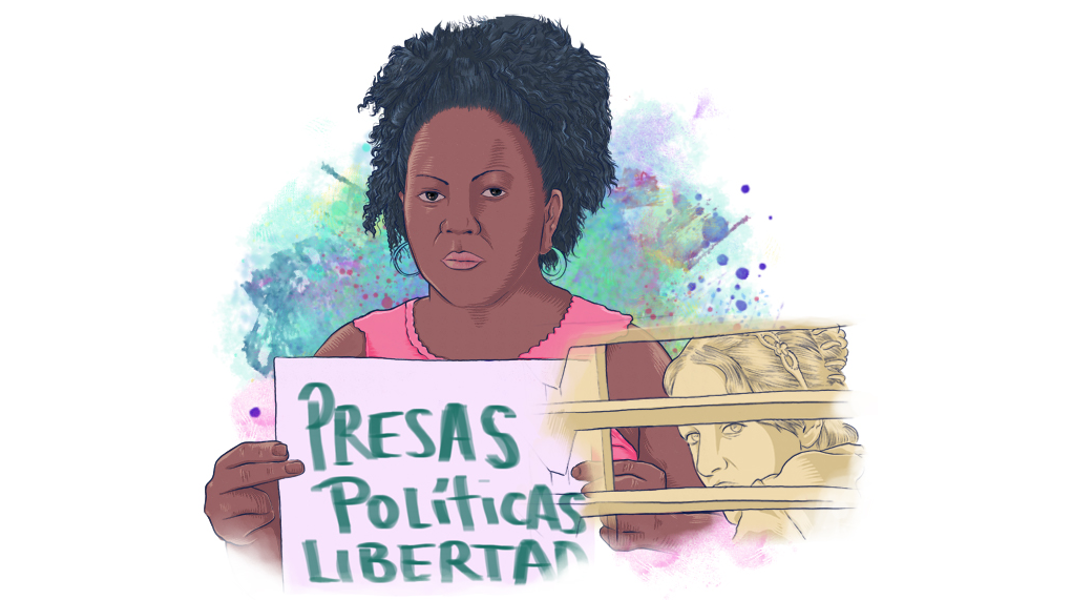“In Santiago, I spent 100 days in an isolation cell”: The story of Lisandra Rivera, victim of State repression in Cuba
Lisandra Rivera first learned about Cuba’s opposition groups when she was 25 years old, living in her hometown of Santiago de Cuba. One Sunday in August 2013, she was at […]

Lisandra Rivera first learned about Cuba’s opposition groups when she was 25 years old, living in her hometown of Santiago de Cuba. One Sunday in August 2013, she was at the beach with her friends when she saw a group of women dressed all in white protesting in the middle of the street. The young women stopped to watch the protesters and ask them about their group, the famed Damas de Blanco. They also watched the police put down the protest.
Before long, Lisandra and her mother joined the Damas. “We went to mass with the Damas every Sunday to demand freedom for political prisoners and for the people of Cuba. We carried out activities for children and brought aid to elderly and sick people,” says Lisandra, now 32 years old.
Later that year, Lisandra also became part of the Patriotic Union of Cuba (UNPACU). Through her involvement with UNPACU, she met Yordanis Chávez, another activist who today is her husband.
A Family Affair
Lisandra comes from a family of activists. Her parents were not part of an organized opposition group, but they were unafraid to criticize Cuba’s political system. In the mid-1990s, both of her parents were arrested and prosecuted. Her father was sentenced to seven and a half years of prison, while her mother received three and a half years of house arrest. “I was four or five years old,” Lisandra remembers, “I didn’t understand what was happening.”
Today, Lisandra’s family continues to face the risks of human rights activism in Cuba. “My mother was pushed out of a guagua [an open-air bus] that she was riding, my husband had teeth knocked out in prison and I had a miscarriage in 2014 after a beating by the police,” she told Race and Equality.
Detention
On February 10, 2016, Lisandra witnessed inspectors and police officers beating her uncle and confiscating the merchandise he was selling at his business.
“I came up and started to ask what was going on. I told them they could not detain anyone arbitrarily, much less beat people. They turned on me and started to mistreat me, but the people around us supported me, so the police chief sent another officer who detained me,” remembers Lisandra.
Lisandra was brought to Santiago’s Police Station No. 3 and held for nine days before being released with a fine. She did not encounter the authorities again until seven months later, in December.
On December 18, says Lisandra, “they came to my house at 5:30am, they detained my husband and my mother. They went and got other neighbors to serve as witnesses while they searched my house. They confiscated a few things and after two or three hours, they detained me.” That day was a Sunday, when Lisandra, her mother and other activists had planned to take part in the Todos Marchamos (We All March) campaign. Lisandra’s relatives were released, but she remained in custody.
On January 17, 2017, Lisandra was put on trial for ‘assault,’ supposedly for striking a police officer during the February 2016 incident. During her trial, she was not allowed to present witnesses; the judge threw out the testimonies of her husband and her cousin who had witnessed the events. The prosecutor, however, presented two police officers who had not even been present during the incident as witnesses. Lisandra was sentenced to two years of deprivation of liberty.
Prison
After her sentence, Lisandra initially spent eleven months in the Santiago de Cuba women’s prison. She spent the remainder of her sentence in a high-security prison in Camagüey.
“In Santiago, I spent 100 days in an isolation cell,” says Lisandra, who was sent there as punishment for refusing to take part in political education or stand at attention before prison officials.
In describing the conditions of Cuban prisons, Lisandra says, “There are never medicines, there are never doctors, the conditions of the cells are horrible, the beds are just slabs, there’s no running water and there’s no lighting. There’s just one little bulb for the entire cell. The security staff are particularly hard on those who are in prison for political reasons. In Camagüey the beds were broken, and there was no running water or lighting.”
Being forced to sleep on a cold, solid block without a mattress caused Lisandra to develop arthritis. Although her family tried to send her medicine, vitamin supplements and extra food, prison officials refused to give them to her. Lisandra did not receive any medical attention until she fell ill with laryngitis.
Today
Lisandra remembers that the day she returned home from prison, “the whole neighborhood” was waiting for her. The next day, she returned to UNPACU’s national office, located in Santiago. Her activism went on a brief but happy hiatus, as she became pregnant soon after. Today, due to her pregnancy and the COVID-19 pandemic, she continues her work “publishing on social media to denounce [abuses].” “I’ve always been tough,” she affirms.

